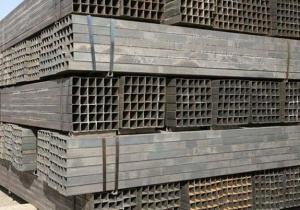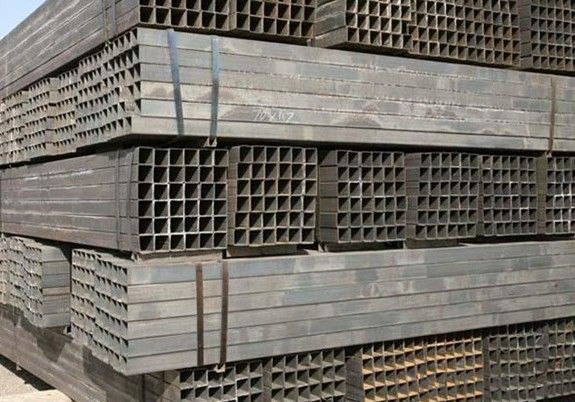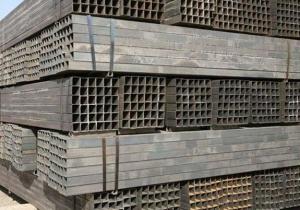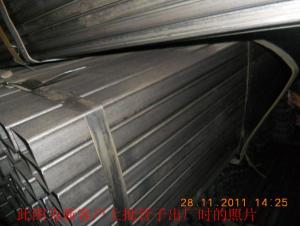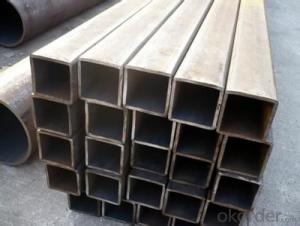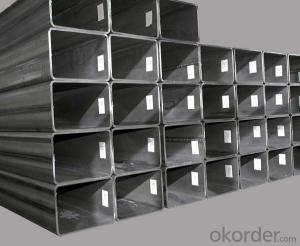HOLLOW SECTION TUBE16Mn
- Loading Port:
- China Main Port
- Payment Terms:
- TT OR LC
- Min Order Qty:
- -
- Supply Capability:
- -
OKorder Service Pledge
OKorder Financial Service
You Might Also Like
Product Name | ||
Size | Size: | 10*10--500*500mm |
Thickness: | 0.45--16mm | |
Length: | 3-12m | |
Steel Grade | Q195,Q215,Q235,Q345,16Mn, 20# | |
Standard | ASTM A500,EN10219,GB/T6728,GB/T6725,JIS G3466 | |
Usage | 1. For Structure, Airport, Railway 2. Construction and so on. | |
Ends | Plain end or By Your Choice | |
Surface | Bared Or With Oiled Or Galvanized | |
Technique | ERW ,Hot Rolled and Cold Rolled | |
Section Shape | Rectangular | |
Inspection | With Hydraulic Testing, Eddy Current , Infrared Test | |
Package | Bags, Bundle, In Bulk, Containers | |
MOQ | 20 Metric Ton / Can Be Negotiated | |
Supply Ability | 15,000 Metric Ton/Month | |
Date of Delivery | 7 days(Qty within 1000 Metric Ton) or According To The Quantity | |
Port of Shipment | Tianjin, China | |
Payment | L/C T/T | |
- Q: How are steel pipes threaded for connection?
- Steel pipes are threaded for connection using a threading machine that cuts grooves into the pipe's outer surface. The machine rotates the pipe while a die cuts the threads, creating a spiral pattern. This threading allows pipes to be securely connected by screwing them together, providing a tight and leak-free joint.
- Q: What are the different methods of pipe lining for steel pipes?
- There are several different methods of pipe lining for steel pipes, each with its own unique features and benefits. These methods include: 1. Spray lining: In this method, a specially formulated coating is sprayed onto the interior surface of the steel pipe. The coating adheres to the pipe and forms a protective barrier against corrosion and chemical damage. Spray lining is relatively quick and cost-effective, making it a popular choice for smaller diameter pipes. 2. Cured-in-place pipe lining (CIPP): CIPP involves inserting a flexible liner into the steel pipe and then curing it in place using steam or hot water. This method creates a seamless and durable lining that restores the structural integrity of the pipe. CIPP is commonly used for larger diameter pipes and can be installed without the need for excavation. 3. Slip lining: Slip lining involves inserting a slightly smaller diameter pipe into the existing steel pipe. The annular space between the two pipes is then grouted or filled with a cementitious material. This method is effective in rehabilitating pipes with minor defects or damages and can significantly increase the pipe's lifespan. 4. Fold-and-form lining: In this method, a flexible liner is inserted into the steel pipe and then expanded to the pipe's diameter using a mechanical or hydraulic process. The liner is then folded and formed to fit the contours of the pipe before being cured in place. Fold-and-form lining is ideal for pipes with irregular shapes or bends. 5. Coating lining: Coating lining involves applying a protective coating to the interior surface of the steel pipe. The coating can be sprayed, brushed, or rolled onto the pipe's surface and provides a barrier against corrosion and chemical damage. This method is commonly used for large diameter pipes or pipes in harsh environments. Each of these methods has its own advantages and disadvantages, and the choice of the lining method will depend on factors such as pipe diameter, condition, budget, and project requirements. It is important to consult with a professional pipe lining contractor to determine the most suitable method for a specific steel pipe rehabilitation project.
- Q: Can steel pipes be used for underwater applications?
- Yes, steel pipes can be used for underwater applications. Steel is a strong and durable material that can withstand the harsh conditions of underwater environments, making it suitable for various applications such as offshore oil and gas exploration, underwater construction, and marine infrastructure. Additionally, steel pipes can be coated with protective layers to prevent corrosion and ensure long-term performance underwater.
- Q: What is the difference between steel pipes and PEX pipes?
- The main difference between steel pipes and PEX pipes lies in their material composition. Steel pipes are made of rigid metal and are typically used for industrial applications, while PEX pipes are made of flexible plastic and are commonly used for residential plumbing systems. Steel pipes offer durability and strength, but can be prone to corrosion. PEX pipes, on the other hand, are corrosion-resistant and easier to install due to their flexibility. Additionally, PEX pipes have better insulation properties and are less likely to burst in freezing temperatures compared to steel pipes.
- Q: How are steel pipes used in the aerospace manufacturing industry?
- Steel pipes are commonly used in the aerospace manufacturing industry for various applications. They are primarily used for the construction of aircraft structures, such as fuselages, wings, and landing gear. Steel pipes offer excellent strength and durability, making them suitable for withstanding the extreme conditions experienced during flight. Additionally, they are used in the aerospace industry to transport fluids, such as fuel and hydraulic systems, due to their ability to handle high pressure and temperature. Overall, steel pipes play a critical role in ensuring the safety, reliability, and performance of aircraft in the aerospace manufacturing industry.
- Q: Can steel pipes be used for hydroelectric power plants?
- Hydroelectric power plants can indeed utilize steel pipes. These power plants frequently employ steel pipes for a variety of purposes. The primary application of steel pipes in these plants is within the penstock, which serves as the conduit for water movement from the reservoir to the turbine. Given the high pressure experienced within the penstock, steel pipes possess the requisite strength and durability to handle both the water flow and pressure. The use of steel pipes in hydroelectric power plants is favored due to their exceptional tensile strength, resistance to corrosion, and long-lasting nature. They can withstand the demanding conditions of high pressure and water flow, thereby ensuring an efficient transfer of water from the reservoir to the turbine. Moreover, the fabrication and installation of steel pipes are straightforward and convenient. These pipes can be tailored to fit the specific requirements of a given project, and they can be joined together using welding or bolts to achieve the desired length and shape. Furthermore, when compared to alternative materials like concrete or fiberglass, steel pipes offer cost-effective advantages. They provide a reliable and economically efficient solution for water conveyance within hydroelectric power plants, thereby contributing to the overall efficiency and effectiveness of the power generation process. In conclusion, steel pipes are commonly employed in hydroelectric power plants as they possess the necessary strength, durability, and cost-effectiveness required for the efficient transfer of water from the reservoir to the turbine. They are an ideal choice for this purpose and are widely regarded as a suitable material for hydroelectric power plants.
- Q: What is the role of steel pipes in the chemical manufacturing industry?
- Steel pipes are an essential component in the chemical manufacturing industry as they are used for various purposes such as transporting chemicals, gases, and liquids safely and efficiently. They provide a durable and corrosion-resistant infrastructure, ensuring the integrity of the chemical processes. Steel pipes also play a crucial role in maintaining the overall safety and reliability of the manufacturing operations.
- Q: What is the difference between steel pipe and concrete pipe?
- The main difference between steel pipe and concrete pipe lies in their material composition. Steel pipes are made from steel, which provides strength, durability, and resistance to corrosion. On the other hand, concrete pipes are made from a mixture of cement, aggregates, and reinforcing materials, offering advantages such as fire resistance and the ability to withstand high pressure. While steel pipes are commonly used for transporting fluids and gases, concrete pipes are often used in drainage and sewage systems.
- Q: What are the different types of supports used for underground steel pipes?
- There are several types of supports commonly used for underground steel pipes, including concrete cradles, saddle supports, and thrust blocks. These supports help distribute the weight and forces acting on the pipe, ensuring its stability and preventing damage.
- Q: How are steel pipes coated for underground applications?
- Steel pipes for underground applications are typically coated using a process called fusion bonded epoxy (FBE) coating. This involves applying a special epoxy powder coating to the surface of the steel pipe and then heating it to fuse the coating into a smooth and durable finish. The FBE coating provides excellent corrosion resistance and protects the steel pipe from the harsh underground environment.
Send your message to us
HOLLOW SECTION TUBE16Mn
- Loading Port:
- China Main Port
- Payment Terms:
- TT OR LC
- Min Order Qty:
- -
- Supply Capability:
- -
OKorder Service Pledge
OKorder Financial Service
Similar products
Hot products
Hot Searches
Related keywords
